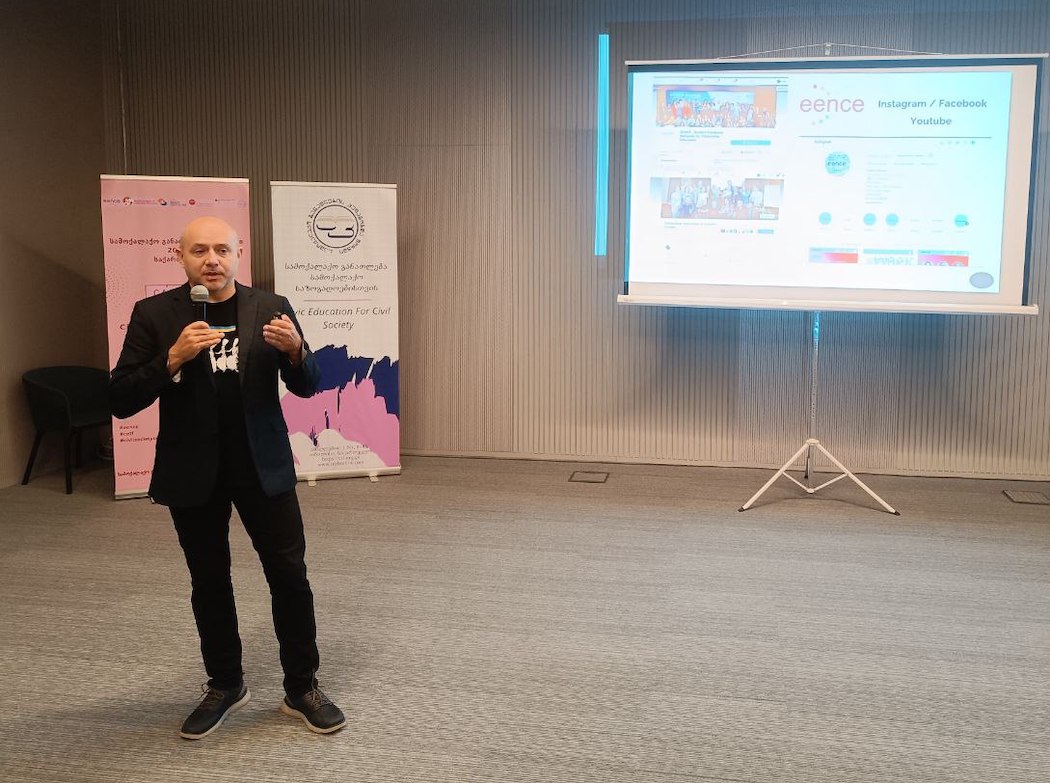New EENCE Coordination Council elected
The elections took place during the Network’s General Meeting held on 14-15 October in Georgia. There were 15 candidates for a seat on the Board.
The elections were preceded by the report of the Network’s previous leadership for 2021-2023, delivered by Yuriy Petrushenko (pictured), Chairman of the Board of the Eastern European Association for Civic Education.
In his speech, he noted that despite the pandemic, severe repression of civil society in Belarus, military clashes between Armenia and Azerbaijan, attempts to restrict freedom of NGO activity in Georgia and to overthrow the democratic government in Moldova, and finally the Russian aggression against Ukraine, which caused the deaths of hundreds of thousands of people and the exodus of millions of people from their homeland, the Network was able to survive and continue its active work in the region.
The Network today has about 90 members from 9 countries.
The Network organised major events such as the Citizenship Education Forum (2022, Moldova) and its satellite events, and the EENCE Citizenship Education Caravan (2023).
Several thousand people participated in the Contest of Ideas for Citizenship Education, which resulted in the support of 6 joint projects of the Network members.
The Network strengthened co-operation with its strategic partners (VrV, NECE) and found new partners. In particular, a partnership was established with Studiefrämjandet Uppsala Västmanland (Sweden). The Network also joined DARE, the Network for the Promotion of Democracy and Human Rights Education in Europe.
The Network’s successes in internal and external communications and resource mobilisation were also noted.
Yuri noted that a big challenge for the Network is to respond to political developments in the region, where EENCE members sometimes take opposing positions.
The passivity of some Network members and the uneven distribution of events throughout the year also remain problems.
The participants of the General Meeting had the opportunity to ask questions and make suggestions on how to improve the work of the Network and the Coordination Council.
After the report of the Council and the Revision Commission was approved, elections were held.
Each of the 15 nominated candidates had an opportunity to state his/her vision of the Network’s priorities.
This was followed by electronic voting, in which those members of the Network who could not come to the meeting also participated.
As a result of voting, 9 people were elected to the Coordination Council.
Among them were Yuriy Petrushenko (Ukraine, Chair of the Council), Natalie Gamtsemlidze (Georgia, Vice-Chair), Vitaut Rudnik (Belarus), Sergiu Musteata (Moldova), Azar Ramazanov and Elmurad Mammadov (both from Azerbaijan), Serhiy Shturkhetskyy (Ukraine).
Oksana Urban, Nazarii Boyarskyi, Olga Petrova (all Ukraine) were elected to the Revision Commission.
The governing bodies of the Network are elected for 2 years.
The first meeting of the new Board of the Network will be held in the near future to agree on areas of responsibility and plans of activities.


